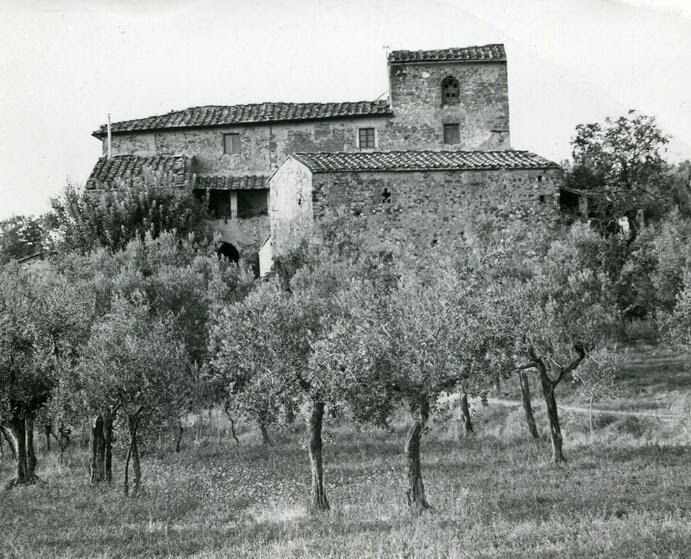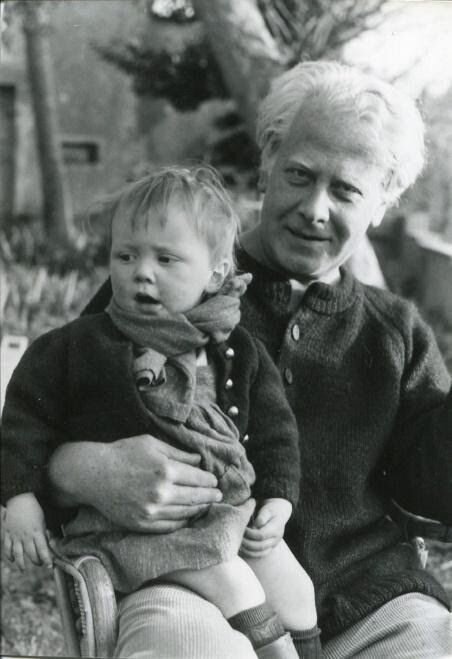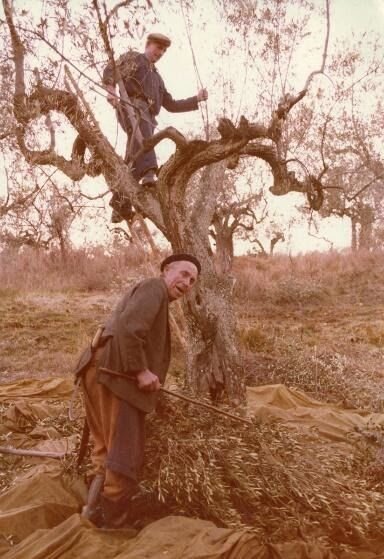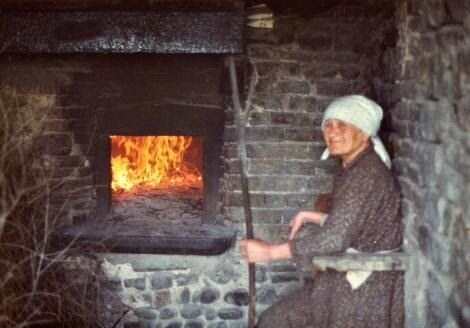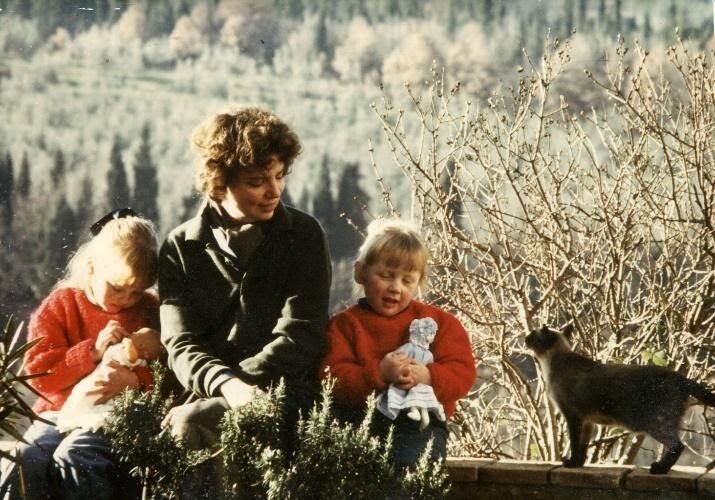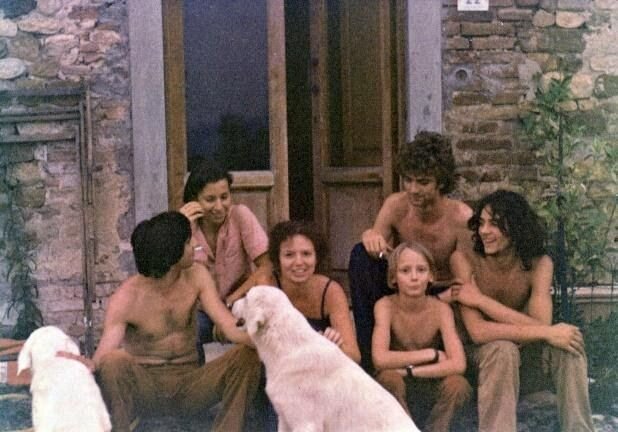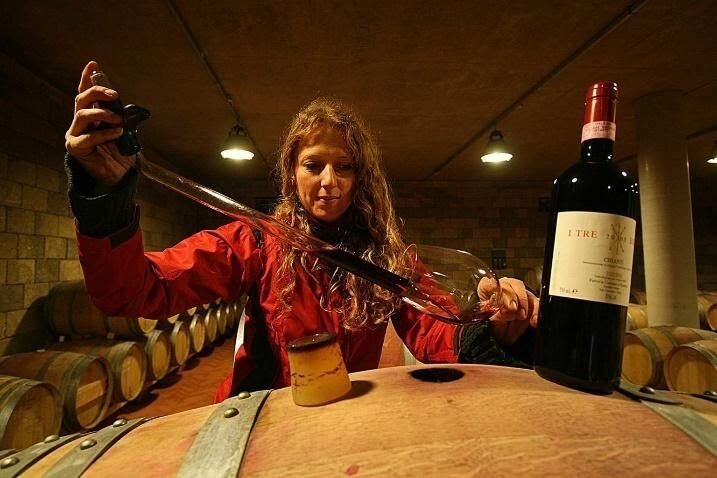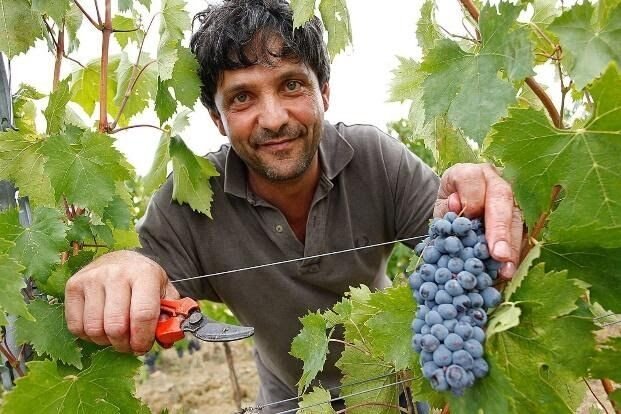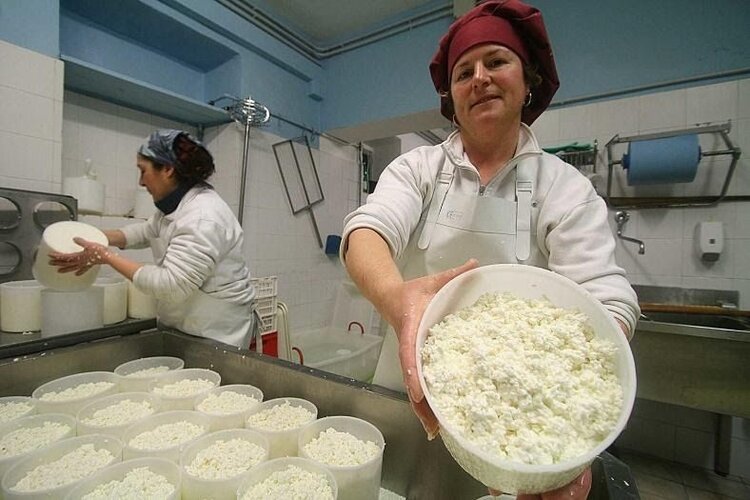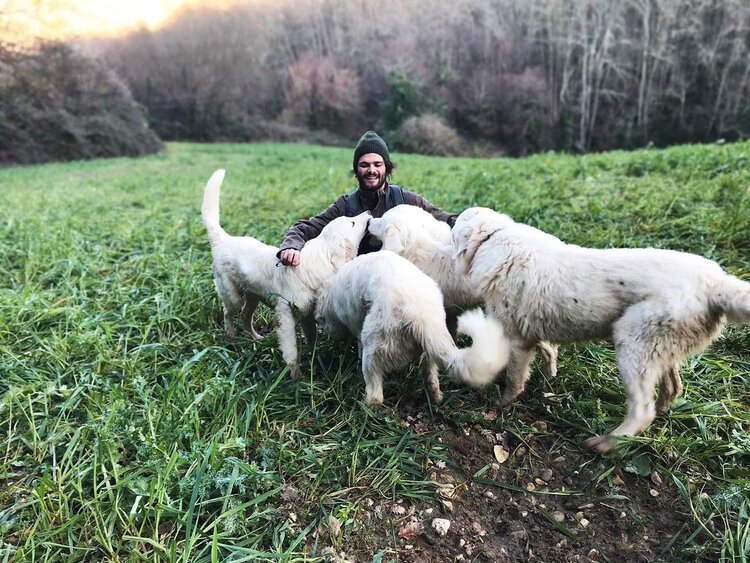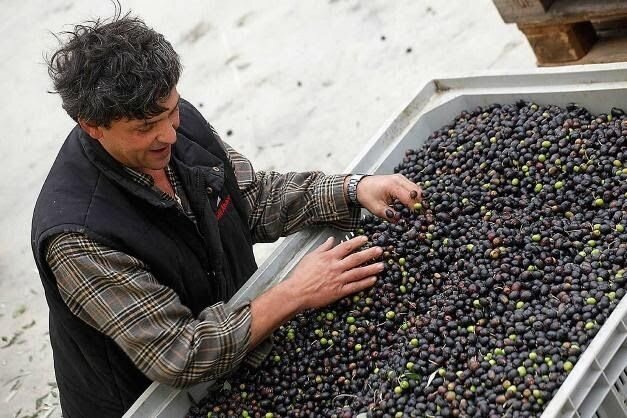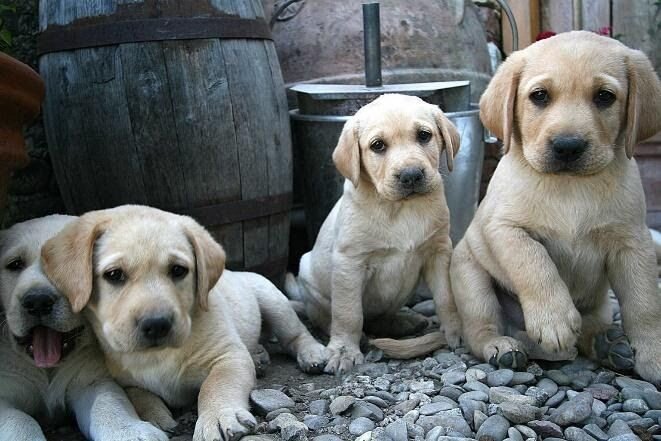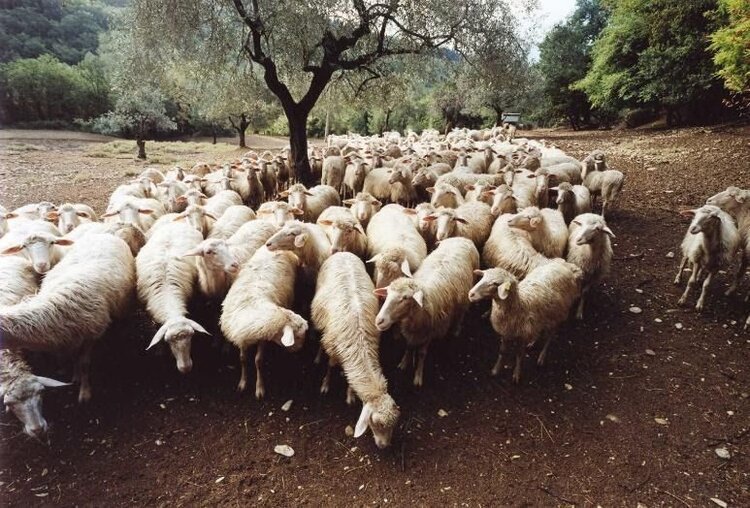A Tuscan Farm Story
Much of this story is provided by Susan Gelpke.
Over the centuries, many outsiders transplant themselves throughout the Italian peninsula and its many islands. This has made the modern country of Italy so diverse and interesting. This process continues, even in current times, like the story of one of my favorite food producers in Tuscany. Corzano e Paterno is an olive oil, cheese farm and winery that was resurrected by Wendel Gelpke, a Swiss architect. The guests of Italian Culinary Tours fall in love with the beautiful Chianti area of Tuscany, with its hilly landscapes adorned by the many vineyards and olive groves. And, Corzano e Paterno is the perfect place for a family farm experience for our guests.
In the early 1970’s, Wendel was so captivated by the wild beauty of the Corzano farm, he offered to buy the farm himself from a friend, Marchese Niccolini, and spare it from division at the hands of speculators. Marchese Niccolini accepted, and Wendel became a farmer. Corzano was a 172.97-acre farm run in the most rudimentary of styles. There was no modern machinery, no running water, electricity or heating in the houses. The seller graciously added an ancient donkey. Also, a few wizened farm workers labored with white oxen in the fields with the sparse vines and olive trees still in production. The long task of reclaiming the land from decades of neglect began. The countryside had been abandoned by the farming population for more lucrative and less backbreaking work in the cities. Wendel came with his seven-year-old son, Till, his nephew, Aljoscha and Till’s beloved white sheep dog, Sascha.
Wendel reclaimed this derelict Tuscan wine farm, and many young friends of the family joined the adventure for shorter and longer periods. In 1975 Wendel set his heart on the adjacent property of 70 hectares of land called La Fattoria di Paterno. It had local fame as a garden due to its abundant water supply. Wendel was able to convince the Marchesa Rangoni-Machiavelli, who was very reluctant to give it up, that once again he would guarantee that the property would not be divided under his ownership. The Fattoria di Paterno had been in the Machiavelli family for generations. After long soul searching, Marchesa was convinced the land would remain intact and decided to part with her much loved and much coveted estate.
The family farmed the land by traditional methods. Wendel, with the help of his wife, Susan, and his five- and six-year-old daughters, Arianna and Sibilla, plus Tillo and Aljoscha, milked the sheep by hand. Later they constructed stables and purchased a milking machine. Aiming for self-sufficiency, Wendel insisted on building the stable and a small cheese producing facility. Today, Antonia, “Toni”, Aljoscha’s wife, makes the much sought-after cheeses from their sheep milk. Antonia, who is half English, and half Italian, first came to visit the farm at the age of 15, met Aljoscha and stayed. They have five children. Following their education, the twins, Oscar and William, returned to the farm to work in the cheese and wine sectors.
At the beginning they sold milk to nearby cheese makers. Wendel insisted on constructing a small dairy, a facility that took over the space that formerly held a wine cellar. Antonia, in addition to raising five children, immersed herself in every aspect of cheese production. First, she apprenticed herself locally to observe the making of the traditional Pecorino cheese. Then, when the dairy was finally functioning, she developed a variety of original sheep cheeses which enjoy an international recognition for innovation and excellence. From time to time, Antonia produces experimental cheeses. Today, guests of Italian Culinary Tours enjoy a tour of the farm followed by an amazing lunch, combined with a wine tasting. From this farm, our chef selects various cheeses for guests to enjoy back at the villa as well.
Wendel and Aljoscha focused on the vineyards. After the initial planting of six hectares and the first awkward attempts at wine making, they developed a more refined and high-quality wine. Aljoscha brought the wine to its current status as one of the Chianti area’s finest wines. As the agronomist, he is the administrator and general manager of the farm.
Susan was born near Boston, MA. After university in the States, she lived in Rome for some years, followed by a stint in New York. She says, “In 1977 on a business trip, I met Wendel in Heathrow Airport and a few weeks later I joined him here on the farm. From an art historian I had become a farmer’s wife with the same happenstance that had brought so much to the creation of Corzano e Paterno.”
Susan continues, “The estate seemed under an enchantment, a romantic ruin. So many of my certainties about modern life had to be reevaluated and more timeless lessons learned. We started from the basics to find the essential worth of things—work, food, relations with the animals that feed us and give us their milk and simple human relations, especially with the locals. It took some time to be accepted by them. Beyond the well-known reserve of Tuscans, any rural community is wary of outsiders, in particular those people doing the work that they themselves had been doing for as long as their families could remember.”
The couple had three daughters in the Villa Paterno, with “attendant ghosts, bringing life and memory back to its long empty rooms,” she says. “The girls followed their brothers and cousin around the farm, tended the sheep and milked. Like their brother Till, they were homeschooled, but they went abroad to study. As children they were well known by the local farmers as the little blond shepherdesses who would sit in the fields and mind the sheep for hours with a book and an apple.”
Wendel died in 2001, but he left behind a working, productive farm run by the members of his family. Antonia cares for the making and distribution of the cheese. Aljoscha took over as agronomist and farm director.
Arianna received her degree in Enology and Viticulture at the University of Florence. She traveled and worked in vineyards in New Zealand and in Bolgheri. Infected by Aljoscha’s zeal, she returned in 2005 to run the cellar and help manage the estate.
Sibilla earned a degree in Philosophy, studied cooking in Paris, and worked at a local restaurant, Osteria di Passignano. She went on to earn a master’s degree in Gastronomy and has worked at the International Press Office of Slow Food. She spent five years in Singapore. In 2016 she and her partner Aran, and children Max and Lily, returned to Corzano e Paterno. She opened a small farm-to-table restaurant.
In 2001 another chapter began for the farm. Aljoscha had considered, then built an underground wine cellar on the Corzano side of the farm. This vast, spacious new building holds some of most lauded wines produced. Antonia has planted a rich and colorful garden on the roof with a view that belies the passage of time.
Susan brings a sense of esthetics to the farm by furnishing and decorating the houses and apartments. Restored by Wendel’s experienced hands, managed by family, Corzano e Paterno offers visitors this popular agriturismo, or “farm-stay.” With vision and work and the finest end products from the raw materials at their disposal combined, Wendel’s family truly enjoy the fruits of their labor, including recognition in the hospitality industry. Their cheeses arrive at the tables of some of the finest restaurants in Europe. Their wines have won international praise.
Although the 2020 pandemic has been a significant setback, work in the vineyards is in full swing. The staff continues winter pruning to set the stage for a successful future harvest. With the addition of Maremmano-Abruzzese dogs to guard their sheep, wolves stay off the premises.
Aljoscha explains. “The Maremmano-Abruzzese is a very particular herd guard dog: confident, capable of independent decisions, territorially oriented and extremely headstrong, a primal dog. However, the dogs are also very docile, intelligent, and friendly but discreet towards their owners. These dogs do not belong inside the house; they thrive in the outdoors. Neither are they here to play with.”
The dogs have been on the farm to guard their homes since the 1970s. With the resurgence of the wolf, the shepherd dogs with their family of six, and with great defense capabilities, watch over the sheep. To develop an instinct to protect, the dogs give birth and grow up in the stables with the sheep. They see themselves as belonging to the flock. The farm has not had a single wolf attack since the beginning of 2020; previously they could lose up to 50 sheep a year.
The rich history of and dedication to Corzano e Paterno attracts our guests. With good reason. Susan goes on to say “The farm remains a family business. Wendel left it to us with the same spirit that it was given to him: the promise that it will not be divided and will remain the basis of our life and work as an extended family,” She expresses “I am astonished, now, to remember what I found here 25 years ago: Wendel’s image of a landscape deeply wounded and in need of encouragement to help it to give back what it so richly now does in wine and olive oil and grazing land, and heartbreaking beauty. La Terra Ingrata, the ungrateful earth he called it, quoting the old farmers. But, it has been good to us, or better said, I think we have been good for each other.”
The farm Corzano e Paterno SS Agricola is owned and operated by Susan Gepke-Doran, Tillo, Sibilla, Arianna, Aglaia Gelpke and Aljoscha Goldschmidt.
Blog Posts


